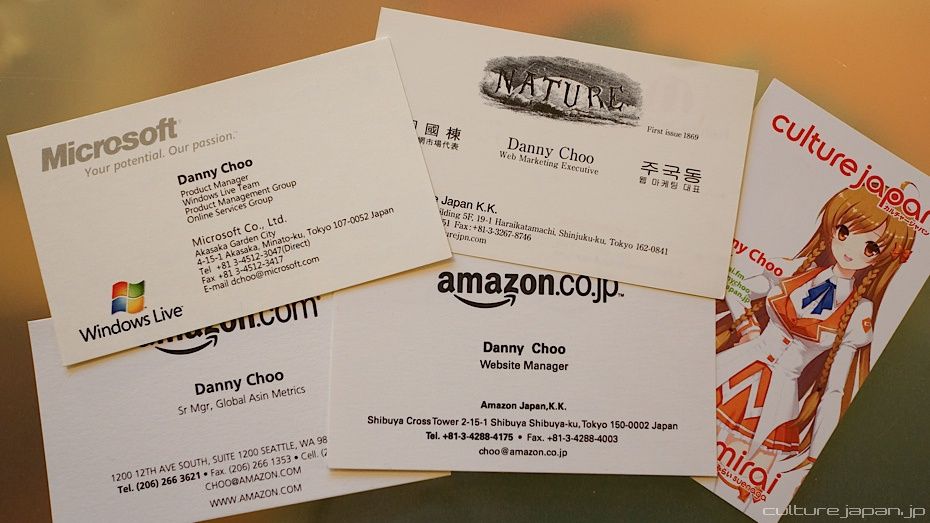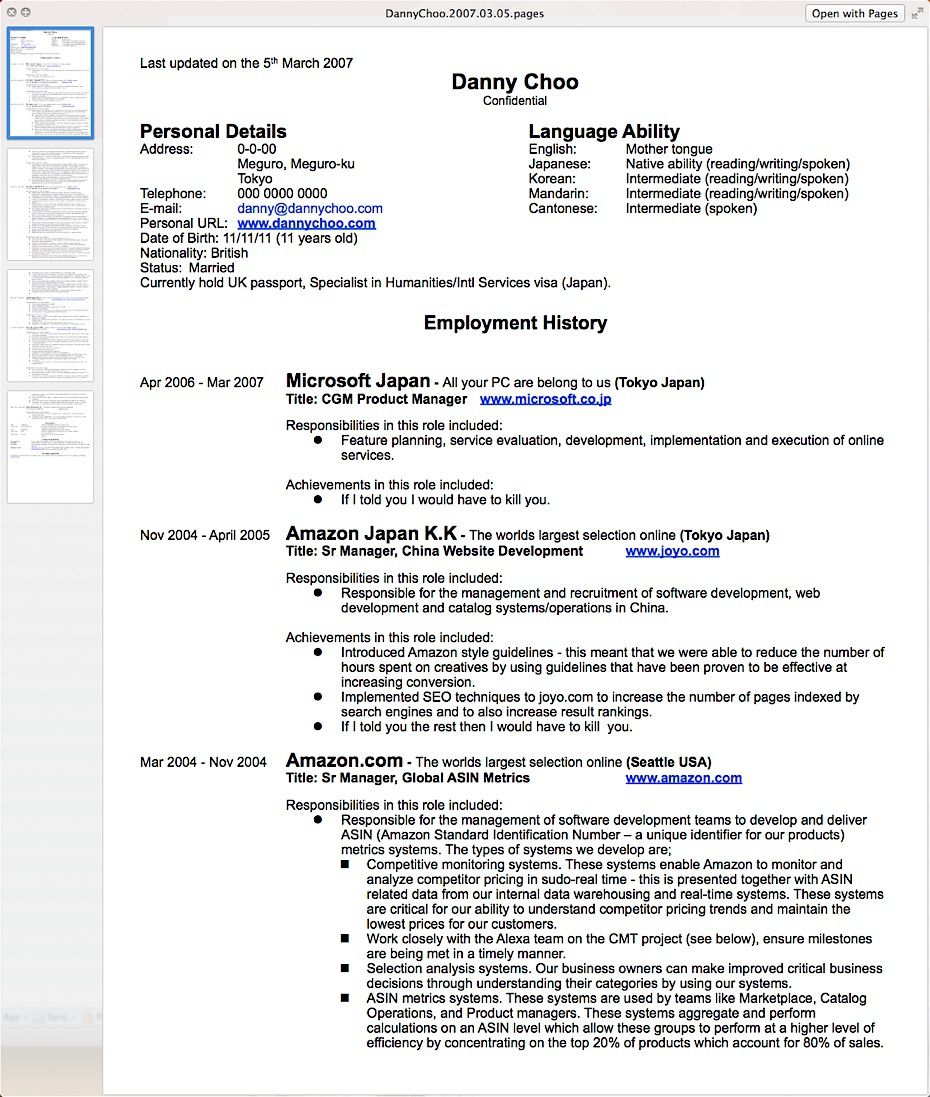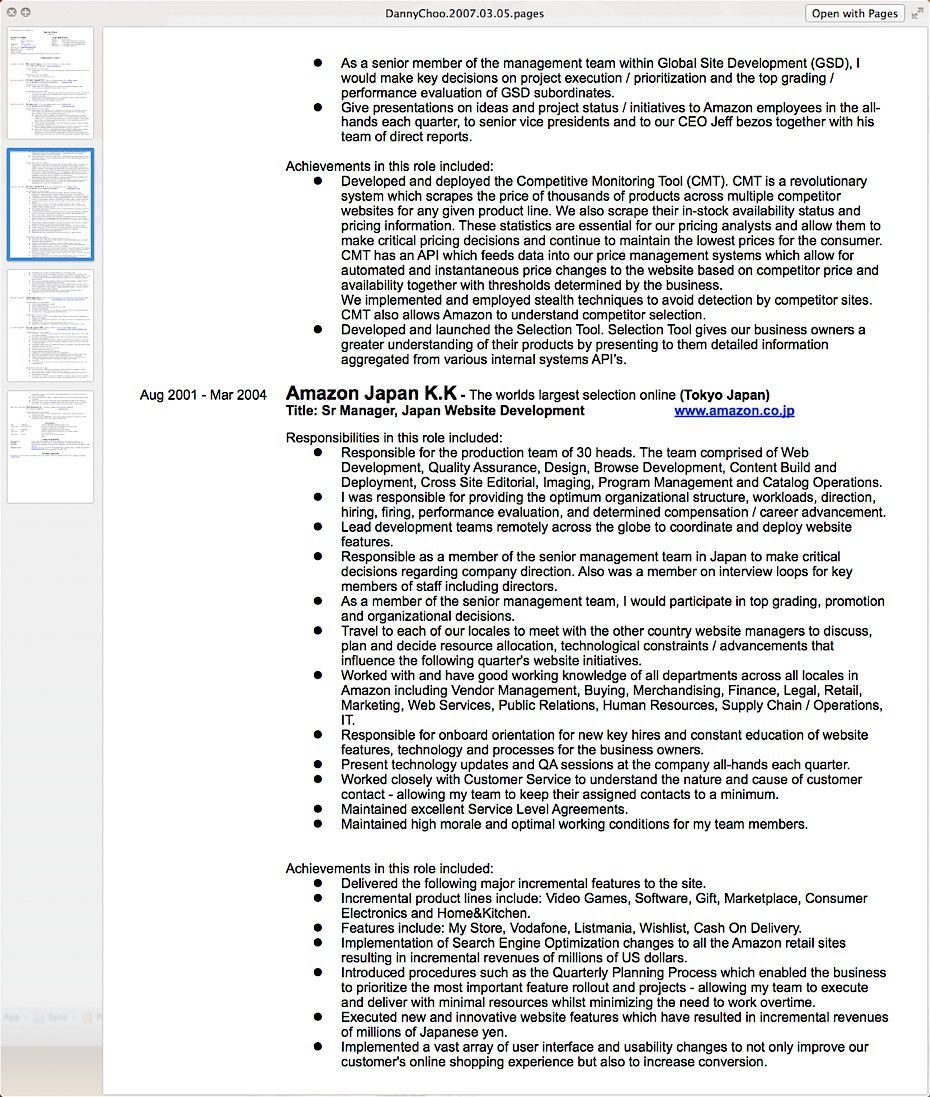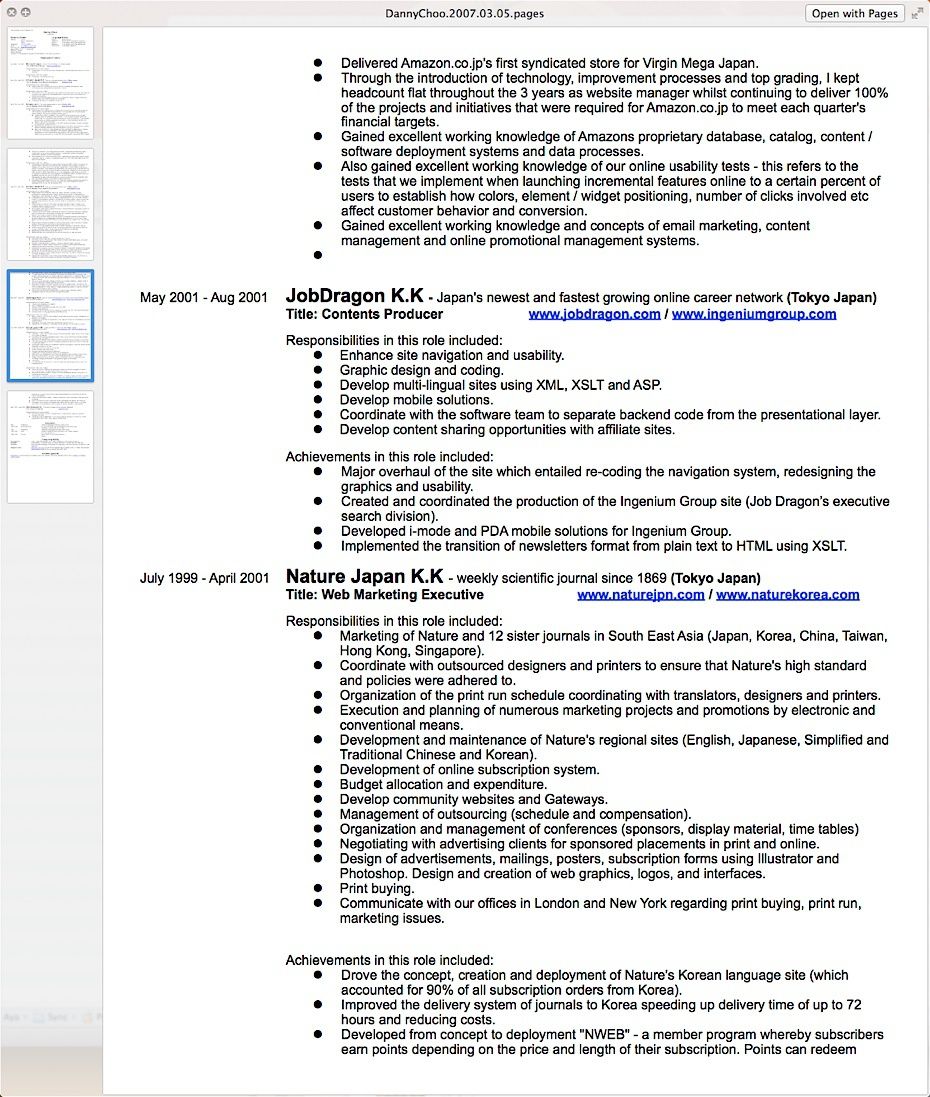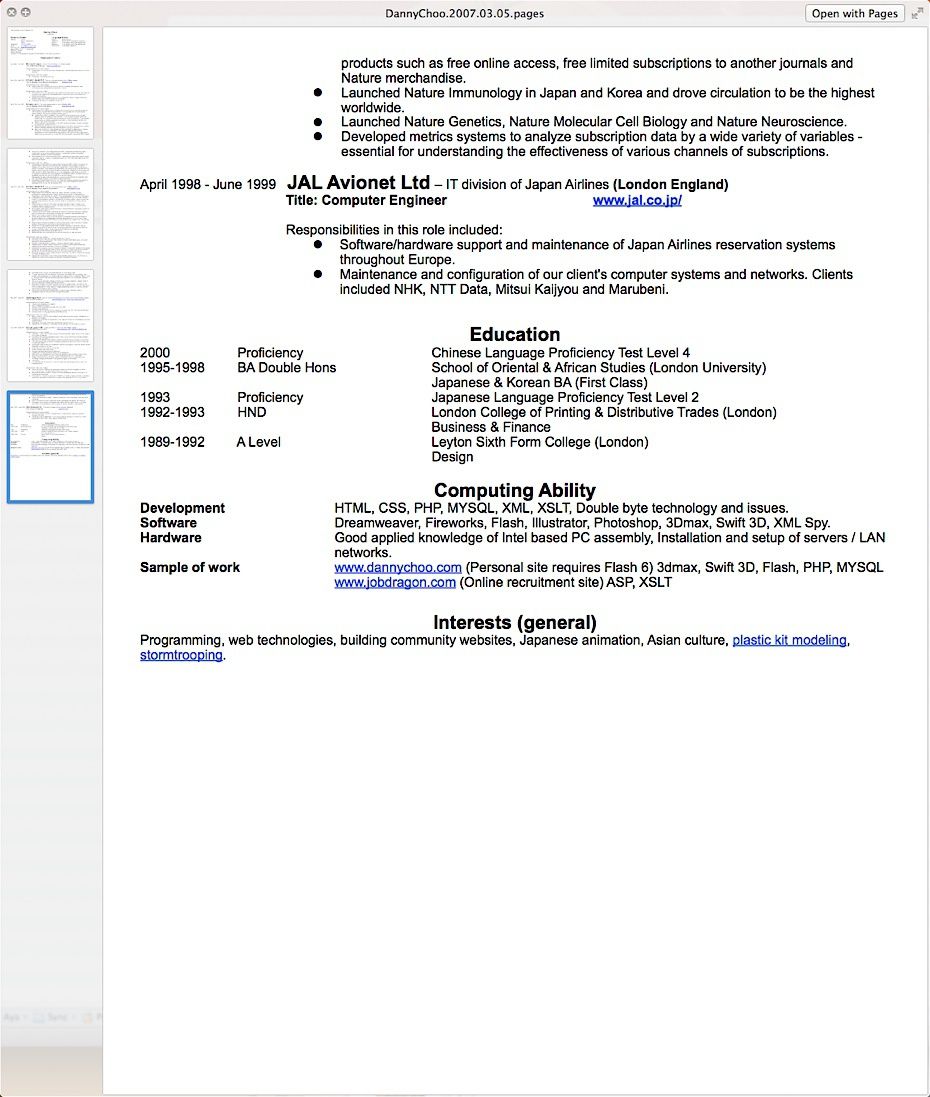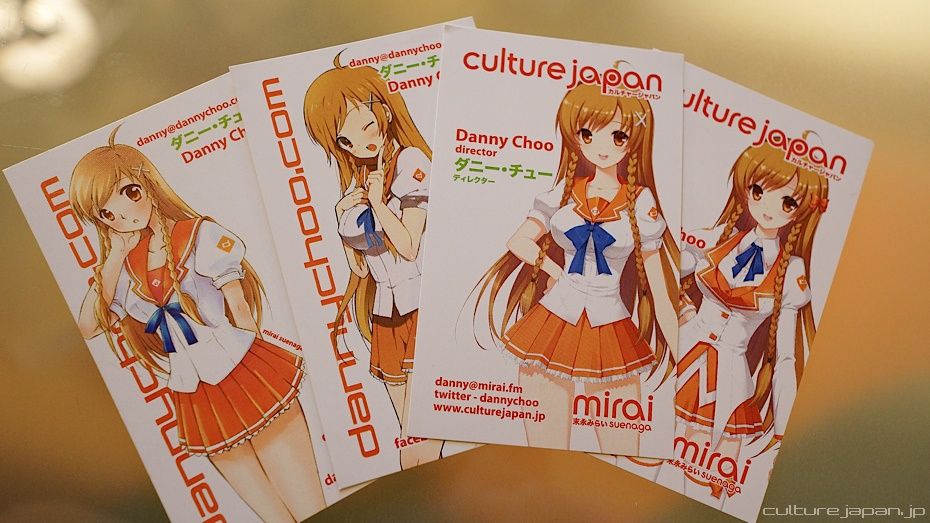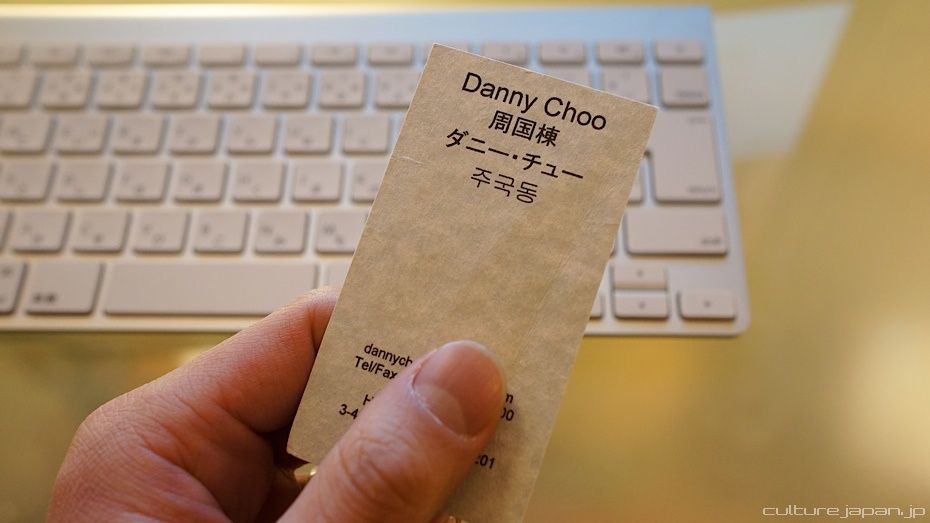There are many resume templates that you can download from the Internets but I thought I'd share a tried and tested resume format that got me jobs at companies like Amazon and Microsoft and interview/job offers from Google and Apple - which I turned down to go to Microsoft ^^;
Anyway, the word file for the my CV is here - feel free to use it.
How to write a resume
I've been refining the format of my resume even when I was working part time in a restaurant called Behihana. Over the years I've learned what the optimum layout was for my skill set and experience.
As a hiring manager at Amazon, I would go through a large amount of CV's when deciding who should be interviewed for positions from QA to Director class hires.
Today, not only would I like to share the template for my resume for you to use, I would also like to share some pointers for those who are looking to write one. Even if you are not in any immediate need to write a resume - I recommend you do so now. Because once you write your resume, you will come to 2 conclusions:-
#1 That looks good and am confident when I submit this resume.
#2 Crap, I need to brush up, learn some skills and gain some experience before anybody will look at this.
#1 That looks good and am confident when I submit this resume.
#2 Crap, I need to brush up, learn some skills and gain some experience before anybody will look at this.
If your conclusion was #2 then you need to do something about it right now - and not just before you start to look for a job. The How I started to build a career in Japan post has pointers of how you can help yourself - because you are the only one who can.
After I left Microsoft to start up my company Mirai Inc, I didn't update the resume as I dont have any more intentions to work for others anymore. Instead, I try to keep my online profile up to date which helps companies decide whether they want to work with me. You will also notice that my online profile format is based loosely on my resume format.
So, this is the first page - and spreads over 4 pages. Many folks say that you should fit everything on 1 page but I disagree - the person reading your resume has not met you and needs as much information about you to make the decision to ask you in for an interview.
Employers want to know roughly where you hail from but in Japan employers particularly want to know if you have a permanent address in Japan which is why its at the top. I also state my visa, marital status and nationality together with my language skills which I wanted to highlight - language skills open more doors in Japan. But - language skills alone will only open doors to schools as an English Teacher - you must have additional abilities to compliment your language skills.
For folks who say that companies get a load of resume's and dont have time to look over more than one page - then you dont want to join a company where HR cant be bothered to do their job properly. Hiring the right people for a job is never a quick process. HR would waste more time choosing people to interview based on just a page of info.
The interview loop for Amazon involved a ton of interviewers - HR would not waste everybody's time by making a decision on just one page - they need as much info as possible before securing interview timeslots which is why you should use as many pages as you need. They want to hire superstars and dont expect to find one from just a single page.
The interview loop for Amazon involved a ton of interviewers - HR would not waste everybody's time by making a decision on just one page - they need as much info as possible before securing interview timeslots which is why you should use as many pages as you need. They want to hire superstars and dont expect to find one from just a single page.
If you are applying for a job at a company that requests just a single page for a resume then its highly unlikely that you will be working with other inspiring superstars like yourself - because their HR cant be bothered to read over more than one page and is only concerned with scoring a hire at the cost of many failed interviews. Believe me - I've seen my share of slobby HR folk.
Anyway, I then have my Employment History - dont put your educational history at the top of the resume. The reason is because an employer wants to know what you can do for her *right now* and they will make a guess based on your previous experience. If you dont have any work experience then go and get some and dont make excuses for yourself saying that you are too busy with school.
While I was at university, I worked at a restaurant called Benihana at night as a part timer nearly everyday from about 5pm through midnight at times. I still made time for my home work and graduated with First Class Honors which I heard that only 10% of graduates in the UK achieve. If an idiot like me can do it then there is no reason why you cant too!
One misconception is that you should earn money while you are gaining experience - not so. In the How Discovering Japan Changed My Life post, you read how I worked for free writing for an anime company. Experience is much more valuable to your career than money - if you got the chance to gain experience then jump at it and dont think about the money.
If you consistently think about money early on in your career then you are really going to do yourself in - because one of the keys to building a successful career will involve doing things that dont involve the exchange of money.
I list companies that I worked at with the most recent at the top - putting my first job at the top does nothing to encourage the potential employer to read on because it contains dated info - your most recent positions are likely to be the most relevant to the job you are applying for.
For every company that you worked for, you should include dates worked and a one liner explaining what the company does together with a URL to their site. You must do this because not everybody would have heard of or know what your previous employers specialize in.
I've seen things like "Previously worked as a developer at Backgammon" with no additional information about Backgammon - the candidate made no effort to explain what Backgammon does and expected me to hunt around for info. At this point, the resume goes in the rejected pile.
For each position that you have been in, you should list all your responsibilities and achievements - both are completely different things.
Usually you would not disclose confidential information about the projects you are working on but at the same time you need to let potential employers know what sort of stuff you have been doing.
Usually you would not disclose confidential information about the projects you are working on but at the same time you need to let potential employers know what sort of stuff you have been doing.
Try to write your achievements and responsibilities in a way that gives just enough information for somebody to understand what you have been working on, for example instead of:-
"My team launched a personalization feature called Slipstream which resulted in 2.5 million incremental users that generated 10.5 million USD in the first quarter of 2012"
You could word it like:-
"My team launched a personalization feature which resulted in millions of incremental users that generated million's of USD in the first quarter of 2012"
"My team launched a personalization feature called Slipstream which resulted in 2.5 million incremental users that generated 10.5 million USD in the first quarter of 2012"
You could word it like:-
"My team launched a personalization feature which resulted in millions of incremental users that generated million's of USD in the first quarter of 2012"
If say you was working at a company where your responsibilities dont sound to exciting - then you can "be more descriptive" - but dont lie. For example, if you was a developer who didn't do much creative work apart from manage archaic spaghetti junction code then you can say something like:-
"Worked closely with my team to code and deliver features on time and to spec which enabled the company to meet its financial targets"I took some of that wording from my own resume where you can find a load of other ways of describing tasks that you do.
"Worked closely with my team to code and deliver features on time and to spec which enabled the company to meet its financial targets"I took some of that wording from my own resume where you can find a load of other ways of describing tasks that you do.
Feel free to copy and reword any part of my resume template - just make sure its all factual because if you start lying then you will need special software just to keep track of all the lies that you will get used to telling ^^;
The end of my resume contains my education history - everything after college only - because anything before is irrelevant. I also list my computing skills which was all picked up from Google sensei. I include links to samples of my work online like artwork and photos. If you got a deviant art account then list it. If you got a Flickr account then list it.
If you got a blog then list it - but only if you dont have any trolling posts which would be archived at Wayback Machine - needless to say that potential employers are not going to be overly impressed to read your trolling trails ^o^とほほ。
If you got a blog then list it - but only if you dont have any trolling posts which would be archived at Wayback Machine - needless to say that potential employers are not going to be overly impressed to read your trolling trails ^o^とほほ。
Anyway, right at the bottom of my resume I have a brief section on my interests. This section is important because it gives your resume more of a human touch rather than just a list of academia.
I did previously list things like the work I did for Mangazine as a writer and other jobs like Benihana but I removed them after a while because they became irrelevant for the jobs that I was applying for - try to keep your resume rellevant and if possible tailor it towards each employer.
If you are sending a resume online then save it as a PDF format before sending because word documents can look completely different depending on the system and OS language setting.
I was going to write about interviewing but that is a subject that will take up a whole post so I will leave it for a later date. But what I do want to advise is to never ever mention money during your first interview - its the keyword that ends the interview there and then because employers are not looking for people who are focused on the money.
If an potential employer does mention money in the interview, they will usually ask you what your current salary is and usually means that they are interested in hiring you. If they ask - you answer. If they dont ask - dont bring it up unless you are looking for a short lived career.
If an potential employer does mention money in the interview, they will usually ask you what your current salary is and usually means that they are interested in hiring you. If they ask - you answer. If they dont ask - dont bring it up unless you are looking for a short lived career.
When you apply for a job, dont let the salary be the first thing you need to find out because many jobs dont list salary anyway. I had no idea what the salary range was when I started to interview at Amazon as Website Manager and you would certainly be doing yourself a disadvantage if you only applied to jobs which stated the salary range.
Up until now I've worked at foreign capital companies like Amazon and Microsoft. If you are applying to work at a traditional Japanese company however, the format of the resume is the same for everybody which you can pick up from a convenience store.
Apart from your resume and online profile, another essential career tool is the business card which I thought I'd talk about.
I have two types of business card - one for anybody and one for business related folks. The business version contains my address and phone number.
Throughout the years I've been using various artists for my card - the latest being DMYO.
Throughout the years I've been using various artists for my card - the latest being DMYO.
Many folks say "I dont have a company or job so I dont need one" - this implies that you are not interested in meeting or building your network unless you do have your own company or job.
A carrer is built upon relationships but especially so in Japan which is why most folk here carry a business card which is known as Meishi.
The starting point to building a relationship is the business card. The card in this photo is the same format of business card that I used when back in London at university - I got a huge sheet of card from a stationers and cut it up to a business card size and used an Epson printer - anybody can make one.
The starting point to building a relationship is the business card. The card in this photo is the same format of business card that I used when back in London at university - I got a huge sheet of card from a stationers and cut it up to a business card size and used an Epson printer - anybody can make one.
My card at the time didn't look fancy but performed its job of enabling me to connect with others and help me grow my network. Carrying a business card around with you at all times is as important as wearing pantsu - I urge all of you to make your own business card to build relationships which will enrich your life and career.
Folks outside of Japan can try services like Moo.com and folks in Japan can (and should) try Tokyo Meishi Land which is where I get all my meishi done.
Anyway, I've babbled long enough for today. The Word file for my resume is here - hope that it will be of use to you as it has been of use to me in my career. And if you do use it and get a job - leave a comment!
Your career has already started and it really is up to you to make sure that you dont end up being the person that you dont want to be.
From now I'll be tagging posts like these as "Career advice" and will try to write as much as I can before I kick the bucket. Some of them listed below.
Anyway, I'm interested in hearing about you and your skills - a few hundred folks over on my Facebook already listed their details and would like to hear about you in the comments! Just leave something like:-
My name is Danny Choo. I was born and raised in the UK but now live in Japan and have been doing so for 13 years.
I run a company called Mirai which shares Japanese culture with the world through Web, TV and Events.
My clients are mainly anime companies - Kadokawa, King Records, Konami, Sony, Good Smile Company, Bushiroad, Production IG, JC Staff and more.
My name is Danny Choo. I was born and raised in the UK but now live in Japan and have been doing so for 13 years.
I run a company called Mirai which shares Japanese culture with the world through Web, TV and Events.
My clients are mainly anime companies - Kadokawa, King Records, Konami, Sony, Good Smile Company, Bushiroad, Production IG, JC Staff and more.
My talents are toilet cleaning.
